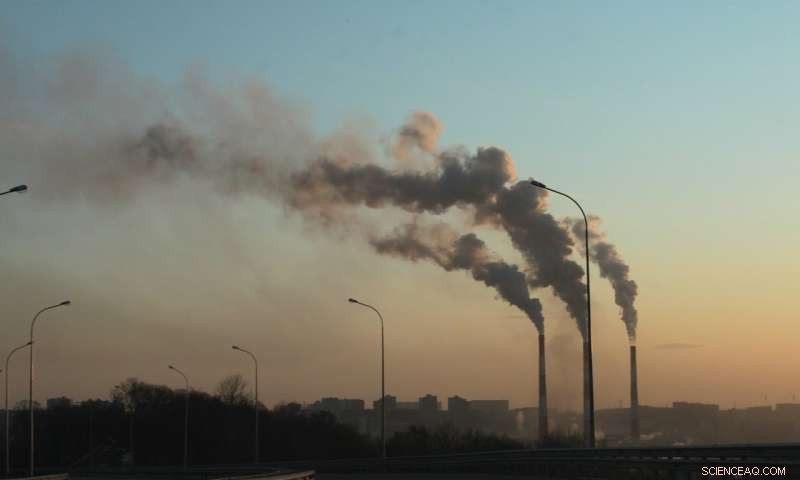Hvordan virksomheder kan styrke deres leverandører til at reducere CO2-emissionerne

Kredit:CC0 Public Domain
Inflation Reduction Act (IRA) er både den vigtigste føderale klimalovgivning nogensinde og desværre utilstrækkelig til at beskytte USA og verden mod virkningerne af klimaændringer. Hvor det kommer til kort, kunne stater gribe ind med skrappere regler - men mange vil ikke. Det efterlader virksomheder, som kan presse deres leverandører til at tage de nødvendige skridt for at forhindre den globale opvarmnings mest ødelæggende virkninger.
Flere ekspertvurderinger er enige om, at IRA vil reducere de amerikanske drivhusgasemissioner med op til en milliard tons om året inden 2030.
Hvis de realiseres fuldt ud, bringer IRA's politikker os en tredjedel af vejen til et sikkert og stabilt klima, et klima, der undgår global opvarmning ud over to grader Celsius over det præindustrielle gennemsnit. Hvor skal de andre to tredjedele af emissionsreduktionerne komme fra?
Mellem Senatets filibuster og Højesterets restriktive afgørelse i West Virginia v. Environmental Protection Agency er det usandsynligt, at større ny føderal lovgivning eller regler med kulstofgrænser vil dukke op. Statsregeringer kunne handle, men halvdelen af de amerikanske emissioner kommer fra stater, der er ligeglade med eller er fjendtlige over for at reducere deres emissioner.
En overraskende stråle af håb dukker op fra en ny undersøgelse, der viser, at globale forsyningskædekontrakter kan spille en rolle i klimaforandringer. Virksomheder kan kræve, at hver leverandør reducerer emissionerne for at fortsætte med at handle med dem.
Ifølge CDP International, en nonprofitorganisation, der administrerer oplysninger om virksomheders emissioner, er den gennemsnitlige virksomheds forsyningskæde ansvarlig for 11 gange flere emissioner end virksomheden selv, hvilket gør kontrakterne, der styrer forsyningskæder, til et stærkt værktøj til at begrænse klimaet. CDP's analyse finder, at eksisterende forsyningskædekontraktkrav fra 200 store virksomheder har fået næsten 24.000 virksomheder til at reducere deres drivhusgasemissioner. Resultatet:Virksomheder reducerer hurtigt emissionerne fra deres forsyningskæder med 1,8 milliarder tons reduceret alene i 2021.
Til sammenligning forventes IRA ikke at nå emissionsreduktioner på 1 milliard tons om året før 2030. Supply chain contracting gør allerede mere for at reducere emissionerne, end IRA vil gøre om otte år.
Store virksomheder som Facebook, Google og Amazon har drevet hurtig vækst af vedvarende energi, selv i stater med få klimaforandringer. For instance, companies are imposing supply chain requirements on suppliers in the South, the region that has led the state-level resistance to climate change mitigation but has emissions roughly equal to those of Germany, the sixth- or seventh-highest-emitting country.
Walmart, the largest retailer in the world, with thousands of suppliers, has worked with the Environmental Defense Fund and other environmental groups on Project Gigaton, which aims to eliminate a billion tons of carbon emissions from Walmart's supply chain between 2017 and 2030. That would have the same impact as Germany becoming carbon neutral a year ahead of schedule.
Facing pressure as a leading Walmart supplier, Tyson Foods recently worked with the Environmental Defense Fund to reduce carbon emissions from its own suppliers—and that's how the "chain" comes into play. Tyson was recognized as one of Walmart's 1,029 "Giga Gurus," a group of suppliers that agree to set carbon emissions goals, share them publicly, and report avoided emissions in the last year—the same types of action that a government regulatory program would require.
Ingersoll Rand, based in North Carolina, responded to pressure from its corporate customers by developing more sustainable transport options. Kimberly-Clark, the Texas-based maker of Huggies and dozens of other everyday products, is pushing its timber suppliers in Alabama and Mississippi to improve climate-related forestry practices. Missouri-based beer giant Anheuser-Busch has committed to powering its U.S. brewing and production facilities with renewable power—and it has developed a program to encourage decarbonization by its suppliers and its suppliers' suppliers. Politics doesn't have to get involved. Many of these corporations are hardly known for being progressive.
Private-sector initiatives have the potential to step in where government has failed to curb emissions and also reduce the partisan gridlock behind those failures. Most people in the U.S., including a majority of Democrats, think big government is a greater threat to the nation than big business, and this mistrust reduces support for climate policy. Learning about nongovernmental responses to climate change can boost conservatives' and moderates' trust in climate science and support for government action.
Of course, we shouldn't fall into the common trap of the "panacea bias," which leads people to consider only actions or policies that single-handedly solve complex problems. Such policies don't exist for a problem as large as climate change.
Rather, we must address large, messy problems with as many smaller actions as possible:some by the federal government, some by state or local governments, some by private businesses or other organizations.
The Inflation Reduction Act is an important step for climate policy in the United States, and it will do a great deal to help our nation meet its climate goals. But it will not hit those targets on its own. Private-sector actions, such as environmental supply chain contracting, can fill the gaps that remain to secure a more stable climate.
 Varme artikler
Varme artikler
-
 Amerikansk grøn økonomi til en værdi af 1,3 billioner dollars om året, men nye politikker er nø…Kredit:CC0 Public Domain Den amerikanske grønne økonomi anslås at generere over 1,3 billioner dollars i omsætning om året, repræsenterer 16,5 % af den globale grønne økonomi, ifølge en ny undersøg
Amerikansk grøn økonomi til en værdi af 1,3 billioner dollars om året, men nye politikker er nø…Kredit:CC0 Public Domain Den amerikanske grønne økonomi anslås at generere over 1,3 billioner dollars i omsætning om året, repræsenterer 16,5 % af den globale grønne økonomi, ifølge en ny undersøg -
 Hvad er forskellen mellem en gade,en vej og en boulevard? I New York City og videre, Broadway er bare Broadway. Kører diagonalt over Manhattan, den berømte hovedvej har ikke gade eller gade knyttet til sit navn i modsætning ti
Hvad er forskellen mellem en gade,en vej og en boulevard? I New York City og videre, Broadway er bare Broadway. Kører diagonalt over Manhattan, den berømte hovedvej har ikke gade eller gade knyttet til sit navn i modsætning ti -
 Amerikanerne bliver mere socialt isolerede, men de føler sig ikke mere ensommeAlene i mængden, men ikke ensom. Kredit:Realstock/shutterstock.com Bliver amerikanerne mere ensomme? Den 1. maj NPR rapporterede om en undersøgelse om ensomhed udført af Cigna, et stort sygeforsi
Amerikanerne bliver mere socialt isolerede, men de føler sig ikke mere ensommeAlene i mængden, men ikke ensom. Kredit:Realstock/shutterstock.com Bliver amerikanerne mere ensomme? Den 1. maj NPR rapporterede om en undersøgelse om ensomhed udført af Cigna, et stort sygeforsi -
 Hvordan laserfyrede jetfly vil fungereDen midlertidige Afloat Forward Staging Base på USS Ponce gennemfører en operationel demonstration af laservåbensystemet (LaWS), mens den er indsat i Den Persiske Golf. U.S. Navy foto af John F. Willi
Hvordan laserfyrede jetfly vil fungereDen midlertidige Afloat Forward Staging Base på USS Ponce gennemfører en operationel demonstration af laservåbensystemet (LaWS), mens den er indsat i Den Persiske Golf. U.S. Navy foto af John F. Willi
- Kropsarbejde:Russias biohackere skubber grænser
- Guld nanopartikler mere stabile ved at sætte ringe på dem
- Verden har aldrig set en kategori 6-orkan, men dagen kan komme
- Mindste fossile abe nogensinde fundet i Kenya
- Pilot, meteorolog dyster om at blive den første tyske kvindelige astronaut
- Kina udruller 5G -tjenester i kapløbet om at indsnævre tekniske huller


